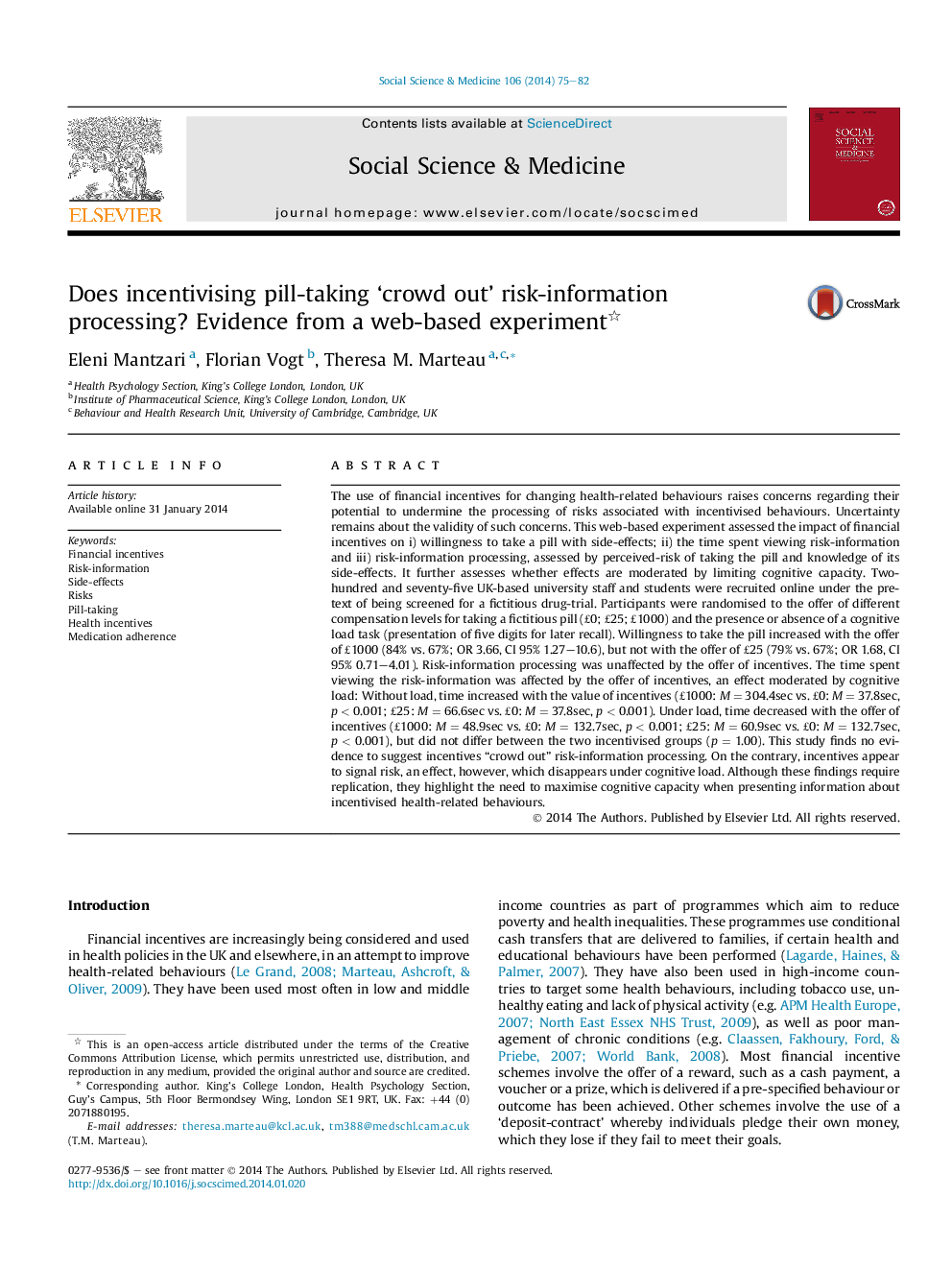| کد مقاله | کد نشریه | سال انتشار | مقاله انگلیسی | نسخه تمام متن |
|---|---|---|---|---|
| 7335517 | 1476062 | 2014 | 8 صفحه PDF | دانلود رایگان |
عنوان انگلیسی مقاله ISI
Does incentivising pill-taking 'crowd out' risk-information processing? Evidence from a web-based experiment
ترجمه فارسی عنوان
آیا اطلاعات محرمانه مصرف قرص "جمع کردن" پردازش اطلاعات ریسک است؟ شواهد از یک آزمایش مبتنی بر وب
دانلود مقاله + سفارش ترجمه
دانلود مقاله ISI انگلیسی
رایگان برای ایرانیان
کلمات کلیدی
مشوق های مالی، اطلاعات خطرناک، اثرات جانبی، خطرات، قرص مصرفی، مشوق های بهداشتی، پایبندی به دارو،
موضوعات مرتبط
علوم پزشکی و سلامت
پزشکی و دندانپزشکی
سیاست های بهداشت و سلامت عمومی
چکیده انگلیسی
The use of financial incentives for changing health-related behaviours raises concerns regarding their potential to undermine the processing of risks associated with incentivised behaviours. Uncertainty remains about the validity of such concerns. This web-based experiment assessed the impact of financial incentives on i) willingness to take a pill with side-effects; ii) the time spent viewing risk-information and iii) risk-information processing, assessed by perceived-risk of taking the pill and knowledge of its side-effects. It further assesses whether effects are moderated by limiting cognitive capacity. Two-hundred and seventy-five UK-based university staff and students were recruited online under the pretext of being screened for a fictitious drug-trial. Participants were randomised to the offer of different compensation levels for taking a fictitious pill (£0; £25; £1000) and the presence or absence of a cognitive load task (presentation of five digits for later recall). Willingness to take the pill increased with the offer of £1000 (84% vs. 67%; OR 3.66, CI 95% 1.27-10.6), but not with the offer of £25 (79% vs. 67%; OR 1.68, CI 95% 0.71-4.01). Risk-information processing was unaffected by the offer of incentives. The time spent viewing the risk-information was affected by the offer of incentives, an effect moderated by cognitive load: Without load, time increased with the value of incentives (£1000: M = 304.4sec vs. £0: M = 37.8sec, p < 0.001; £25: M = 66.6sec vs. £0: M = 37.8sec, p < 0.001). Under load, time decreased with the offer of incentives (£1000: M = 48.9sec vs. £0: M = 132.7sec, p < 0.001; £25: M = 60.9sec vs. £0: M = 132.7sec, p < 0.001), but did not differ between the two incentivised groups (p = 1.00). This study finds no evidence to suggest incentives “crowd out” risk-information processing. On the contrary, incentives appear to signal risk, an effect, however, which disappears under cognitive load. Although these findings require replication, they highlight the need to maximise cognitive capacity when presenting information about incentivised health-related behaviours.
ناشر
Database: Elsevier - ScienceDirect (ساینس دایرکت)
Journal: Social Science & Medicine - Volume 106, April 2014, Pages 75-82
Journal: Social Science & Medicine - Volume 106, April 2014, Pages 75-82
نویسندگان
Eleni Mantzari, Florian Vogt, Theresa M. Marteau,
